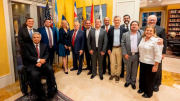Adrian Suarez Avila/ News Director
Students at the University are engaging in research that helps the United States Department of State draft policies.
The research is conducted through the Diplomacy Lab, a project created under the collaboration of the University’s Latin American and Caribbean Center, the Applied Research Center and the U.S. State Department.
According to José Miguel Cruz, visiting assistant professor of politics and supervisor of the Diplomacy Lab, the program started in the spring semester of 2014 and serves as an opportunity for students to conduct research on topics that are of interest to the U.S. Department of State in developing activities and proposing policies.
The papers that the student researchers compile may range from 15 to 60 pages.
Cruz’s duties involve supervising the student researchers as they undertake their semester-long research project. The group is comprised of both undergraduate and graduate students who may have knowledge on the research topic in question as a result of their academic interests.
He admits that the Lab takes an interdisciplinary approach when selecting candidates, looking for students in a variety of academic disciplines who may provide diverse pieces of knowledge.
Since the program is fairly new to the University, faculty members of the LACC identify students who they consider to be outstanding examples of people who can contribute to the research efforts of the Diplomacy Lab.
Working with the Lab provides its student researchers an opportunity for them to be involved in an effort that opens doors for interaction with officials from the U.S. Department of State.
These interactions take the form of phone calls and video conferences between the officials and students, through which they discuss the progress of their project.
According to Cruz, the University is one of only three institutions of higher learning in the country that are partnering with the Department of State for these research efforts.
The other two institutions are the College of William and Mary and the University of Virginia.
Students shared their thoughts.
“This program is the sort of thing that I feel more students should know about, especially considering that many people here are interested in what’s going on around the world,” said Jasmine Rodriguez, a senior history major.
Cruz stated that this partnership benefits the University to the extent that it allows students to have direct interaction with issues on an international scope and provides students a chance to understand how our globalized country functions and interacts with other nations and cultures.
While the Department of State provides the LACC with a list of research topics, the members of the department are in charge of deciding the topic for the semester.
The first semester of the program saw the examination of issues dealing with prisons in Latin America, and the second semester covered the issue of gender-based violence in the Caribbean.
This year the topic deals with judiciary reform in Latin America.
In choosing the topics, the directors of the Diplomacy Lab take into consideration the capabilities of the University’s faculty and its ability to contribute its expertise on the research topic.
Taking into consideration the security and governance program it offers, the LACC chose this year’s topic in order to further understand a related issue.
Usually, the research involves literature reviews of online and print sources. Rarely do the student researchers rely on interviews.
“Because of the diversity of our faculty and our students [this] opens a lot of opportunities to get deeper on the issues that are in the interests of the State Department,” Cruz said.






Be the first to comment on "Student research aims to draft policy in U.S. Dept. of State"